- Home
- Arthur Conan Doyle
His Last Bow shssc-4 Page 7
His Last Bow shssc-4 Read online
Page 7
"Does he not explain?"
Holmes handed me his brother's telegram.
Must see you over Cadogan West. Coming at once.
MYCROFT.
"Cadogan West? I have heard the name."
"It recalls nothing to my mind. But that Mycroft should break out in this erratic fashion! A planet might as well leave its orbit. By the way, do you know what Mycroft is?"
I had some vague recollection of an explanation at the time of the Adventure of the Greek Interpreter. "You told me that he had some small office under the British government."
Holmes chuckled. "I did not know you quite so well in those days. One has to be discreet when one talks of high matters of state. You are right in thinking that he is under the British government. You would also be right in a sense if you said that occasionally he is the British government."
"My dear Holmes!"
"I thought I might surprise you. Mycroft draws four hundred and fifty pounds a year, remains a subordinate, has no ambitions of any kind, will receive neither honor nor title, but remains the most indispensable man in the country."
"But how?"
"Well, his position is unique. He has made it for himself. There has never been anything like it before, nor will be again. He has the tidiest and most orderly brain, with the greatest capacity for storing facts, of any man living. The same great powers which I have turned to the detection of crime he has used for this particular business. The conclusions of every department are passed to him, and he is the central exchange, the clearinghouse, which makes out the balance. All other men are specialists, but his specialty is omniscience. We will suppose that a minister needs information as to a point which involves the Navy, India, Canada and the bimetallic question; he could get his separate advices from various departments upon each, but only Mycroft can focus them all, and say offhand how each factor would affect the other. They began by using him as a short-cut, a convenience; now he has made himself an essential. In that great brain of his everything is pigeonholed and can be handed out in an instant. Again and again his word has decided the national policy. He lives in it. He thinks of nothing else save when, as an intellectual exercise, he unbends if I call upon him and ask him to advise me on one of my little problems. But Jupiter is descending today. What on earth can it mean? Who is Cadogan West, and what is he to Mycroft?"
"I have it," I cried, and plunged among the litter of papers upon the sofa. "Yes, yes, here he is, sure enough! Cadogan West was the young man who was found dead on the Underground on Tuesday morning."
Holmes sat up at attention, his pipe halfway to his lips. "This must be serious, Watson. A death which has caused my brother to alter his habits can be no ordinary one. What in the world can he have to do with it? The case was featureless as I remember it. The young man had apparently fallen out of the train and killed himself. He had not been robbed, and there was no particular reason to suspect violence. Is that not so?"
"There has been an inquest," said I, "and a good many fresh facts have come out. Looked at more closely, I should certainly say that it was a curious case."
"Judging by its effect upon my brother, I should think it must be a most extraordinary one." He snuggled down in his armchair. "Now, Watson, let us have the facts."
"The man's name was Arthur Cadogan West. He was twenty-seven years of age, unmarried, and a clerk at Woolwich Arsenal."
"Government employ. Behold the link with Brother Mycroft!"
"He left Woolwich suddenly on Monday night. Was last seen by his fiancee, Miss Violet Westbury, whom he left abruptly in the fog about 7:30 that evening. There was no quarrel between them and she can give no motive for his action. The next thing heard of him was when his dead body was discovered by a plate-layer named Mason, just outside Aldgate Station on the Underground system in London."
"When?"
"The body was found at six on the Tuesday morning. It was lying wide of the metals upon the left hand of the track as one goes eastward, at a point close to the station, where the line emerges from the tunnel in which it runs. The head was badly crushed – an injury which might well have been caused by a fall from the train. The body could only have come on the line in that way. Had it been carried down from any neighboring street, it must have passed the station barriers, where a collector is always standing. This point seems absolutely certain."
"Very good. The case is definite enough. The man, dead or alive, either fell or was precipitated from a train. So much is clear to me. Continue."
"The trains which traverse the lines of rail beside which the body was found are those which run from west to east, some being purely Metropolitan, and some from Willesden and outlying junctions. It can be stated for certain that this young man when he met his death, was traveling in this direction at some late hour of the night, but at what point he entered the train it is impossible to state."
"His ticket, of course, would show that."
"There was no ticket in his pockets."
"No ticket! Dear me, Watson, this is really very singular. According to my experience it is not possible to reach the platform of a Metropolitan train without exhibiting one's ticket. Presumably, then, the young man had one. Was it taken from him in order to conceal the station from which he came? It is possible. Or did he drop it in the carriage? That also is possible. But the point is of curious interest. I understand that there was no sign of robbery?"
"Apparently not. There is a list here of his possessions. His purse contained two pounds fifteen. He had also a checkbook on the Woolwich branch of the Capital and Counties Bank. Through this his identity was established. There were also two dress-circle tickets for the Woolwich Theatre, dated for that very evening. Also a small packet of technical papers."
Holmes gave an exclamation of satisfaction. "There we have it at last, Watson! British government – Woolwich. Arsenal – technical papers – Brother Mycroft, the chain is complete. But here he comes, if I am not mistaken, to speak for himself."
A moment later the tall and portly form of Mycroft Holmes was ushered into the room. Heavily built and massive, there was a suggestion of uncouth physical inertia in the figure, but above this unwieldy frame there was perched a head so masterful in its brow, so alert in its steel-gray, deep-set eyes, so firm in its lips, and so subtle in its play of expression, that after the first glance one forgot the gross body and remembered only the dominant mind.
At his heels came our old friend Lestrade, of Scotland Yard – thin and austere. The gravity of both their faces foretold some weighty quest. The detective shook hands without a word. Mycroft Holmes struggled out of his overcoat and subsided into an armchair.
"A most annoying business, Sherlock," said he. "I extremely dislike altering my habits, but the powers that be would take no denial. In the present state of Siam it is most awkward that I should be away from the office. But it is a real crisis. I have never seen the Prime Minister so upset. As to the Admiralty – it is buzzing like an overturned beehive. Have you read up the case?"
"We have just done so. What were the technical papers?"
"Ah, there's the point! Fortunately, it has not come out. The press would be furious if it did. The papers which this wretched youth had in his pocket were the plans of the Bruce-Partington submarine."
Mycroft Holmes spoke with a solemnity which showed his sense of the importance of the subject. His brother and I sat expectant. "Surely you have heard of it? I thought everyone had heard of it."
"Only as a name."
"Its importance can hardly be exaggerated. It has been the most jealously guarded of all government secrets. You may take it from me that naval warfare becomes impossible within the radius of a Bruce-Partington's operation. Two years ago a very large sum was smuggled through the Estimates and was expended in acquiring a monopoly of the invention. Every effort has been made to keep the secret. The plans, which are exceedingly intricate, comprising some thirty separate patents, each essential to the working of the whole, are kept in an e
laborate safe in a confidential office adjoining the arsenal, with burglarproof doors and windows. Under no conceivable circumstances were the plans to be taken from the office. If the chief constructor of the Navy desired to consult them, even he was forced to go to the Woolwich office for the purpose. And yet here we find them in the pocket of a dead junior clerk in the heart of London. From an official point of view it's simply awful."
"But you have recovered them?"
"No, Sherlock, no! That's the pinch. We have not. Ten papers were taken from Woolwich. There were seven in the pocket of Cadogan West. The three most essential are gone – stolen, vanished. You must drop everything, Sherlock. Never mind your usual petty puzzles of the police-court. It's a vital international problem that you have to solve. Why did Cadogan West take the papers, where are the missing ones, how did he die, how came his body where it was found, how can the evil be set right? Find an answer to all these questions, and you will have done good service for your country."
"Why do you not solve it yourself, Mycroft? You can see as far as I."
"Possibly, Sherlock. But it is a question of getting details. Give me your details, and from an armchair I will return you an excellent expert opinion. But to run here and run there, to cross-question railway guards, and lie on my face with a lens to my eye – it is not my mйtier. No, you are the one man who can clear the matter up. If you have a fancy to see your name in the next honors list —"
My friend smiled and shook his head. "I play the game for the game's own sake," said he. "But the problem certainly presents some points of interest, and I shall be very pleased to look into it. Some more facts, please."
"I have jotted down the more essential ones upon this sheet of paper, together with a few addresses which you will find of service. The actual official guardian of the papers is the famous government expert, Sir James Walter, whose decorations and subtitles fill two lines of a book of reference. He has grown gray in the service, is a gentleman, a favored guest in the most exalted houses, and, above all, a man whose patriotism is beyond suspicion. He is one of two who have a key of the safe. I may add that the papers were undoubtedly in the office during working hours on Monday, and that Sir James left for London about three o'clock taking his key with him. He was at the house of Admiral Sinclair at Barclay Square during the whole of the evening when this incident occurred."
"Has the fact been verified?"
"Yes; his brother, Colonel Valentine Walter, has testified to his departure from Woolwich, and Admiral Sinclair to his arrival in London; so Sir James is no longer a direct factor in the problem."
"Who was the other man with a key?"
"The senior clerk and draftsman, Mr. Sidney Johnson. He is a man of forty, married, with five children. He is a silent, morose man, but he has, on the whole, an excellent record in the public service. He is unpopular with his colleagues, but a hard worker. According to his own account, corroborated only by the word of his wife, he was at home the whole of Monday evening after office hours, and his key has never left the watch-chain upon which it hangs."
"Tell us about Cadogan West."
"He has been ten years in the service and has done good work. He has the reputation of being hotheaded and impetuous, but a straight, honest man. We have nothing against him. He was next to Sidney Johnson in the office. His duties brought him into daily, personal contact with the plans. No one else had the handling of them."
"Who locked the plans up that night?"
"Mr. Sidney Johnson, the senior clerk."
"Well, it is surely perfectly clear who took them away. They are actually found upon the person of this junior clerk, Cadogan West. That seems final, does it not?"
"It does, Sherlock, and yet it leaves so much unexplained. In the first place, why did he take them?"
"I presume they were of value?"
"He could have got several thousands for them very easily."
"Can you suggest any possible motive for taking the papers to London except to sell them?"
"No, I cannot."
"Then we must take that as our working hypothesis. Young West took the papers. Now this could only be done by having a false key —"
"Several false keys. He had to open the building and the room."
"He had, then, several false keys. He took the papers to London to sell the secret, intending, no doubt, to have the plans themselves back in the safe next morning before they were missed. While in London on this treasonable mission he met his end."
"How?"
"We will suppose that he was traveling back to Woolwich when he was killed and thrown out of the compartment."
"Aldgate, where the body was found, is considerably past the station for London Bridge, which would be his route to Woolwich."
"Many circumstances could be imagined under which he would pass London Bridge. There was someone in the carriage, for example, with whom he was having an absorbing interview. This interview led to a violent scene in which he lost his life. Possibly he tried to leave the carriage, fell out on the line, and so met his end. The other closed the door. There was a thick fog, and nothing could be seen."
"No better explanation can be given with our present knowledge; and yet consider, Sherlock, how much you leave untouched. We will suppose, for argument's sake, that young Cadogan West had determined to convey these papers to London. He would naturally have made an appointment with the foreign agent and kept his evening clear. Instead of that he took two tickets for the theater, escorted his fiancee halfway there, and then suddenly disappeared."
"A blind," said Lestrade, who had sat listening with some impatience to the conversation.
"A very singular one. That is objection No. 1. Objection No. 2: We will suppose that he reaches London and sees the foreign agent. He must bring back the papers before morning or the loss will be discovered. He took away ten. Only seven were in his pocket. What had become of the other three? He certainly would not leave them of his own free will. Then, again, where is the price of his treason? One would have expected to find a large sum of money in his pocket."
"It seems to me perfectly clear," said Lestrade. "I have no doubt at all as to what occurred. He took the papers to sell them. He saw the agent. They could not agree as to price. He started home again, but the agent went with him. In the train the agent murdered him, took the more essential papers, and threw his body from the carriage. That would account for everything, would it not?"
"Why had he no ticket?"
"The ticket would have shown which station was nearest the agent's house. Therefore he took it from the murdered man's pocket."
"Good, Lestrade, very good," said Holmes. "Your theory holds together. But if this is true, then the case is at an end. On the one hand, the traitor is dead. On the other, the plans of the Bruce-Partington submarine are presumably already on the Continent. What is there for us to do?"
"To act, Sherlock – to act!" cried Mycroft, springing to his feet. "All my instincts are against this explanation. Use your powers! Go to the scene of the crime! See the people concerned! Leave no stone unturned! In all your career you have never had so great a chance of serving your country."
"Well, well!" said Holmes, shrugging his shoulders. "Come, Watson! And you, Lestrade, could you favor us with your company for an hour or two? We will begin our investigation by a visit to Aldgate Station. Good-bye, Mycroft. I shall let you have a report before evening, but I warn you in advance that you have little to expect."
An hour later Holmes, Lestrade and I stood upon the Underground railroad at the point where it emerges from the tunnel immediately before Aldgate Station. A courteous red-faced old gentleman represented the railway company. "This is where the young man's body lay," said he, indicating a spot about three feet from the metals. "It could not have fallen from above, for these, as you see, are all blank walls. Therefore, it could only have come from a train, and that train, so far as we can trace it, must have passed about midnight on Monday."
"Have the carriages
been examined for any sign of violence?"
"There are no such signs, and no ticket has been found."
"No record of a door being found open?"
"None."
"We have had some fresh evidence this morning," said Lestrade. "A passenger who passed Aldgate in an ordinary Metropolitan train about 11:40 on Monday night declares that he heard a heavy thud, as of a body striking the line, just before the train reached the station. There was dense fog, however, and nothing could be seen. He made no report of it at the time. Why whatever is the matter with Mr. Holmes?"
My friend was standing with an expression of strained intensity upon his face, staring at the railway metals where they curved out of the tunnel. Aldgate is a junction, and there was a network of points. On these his eager, questioning eyes were fixed, and I saw on his keen, alert face that tightening of the lips, that quiver of the nostrils, and concentration of the heavy tufted brows which I knew so well. "Points," he muttered, "the points."
"What of it? What do you mean?"
"I suppose there are no great number of points on a system such as this?"
"No; there are very few."
"And a curve, too. Points, and a curve. By Jove! if it were only so."
"What is it, Mr. Holmes? Have you a clue?"
"An idea – an indication, no more. But the case certainly grows in interest. Unique, perfectly unique, and yet why not? I do not see any indications of bleeding on the line."
"There were hardly any."
"But I understand that there was a considerable wound."
"The bone was crushed, but there was no great external injury."
"And yet one would have expected some bleeding. Would it be possible for me to inspect the train which contained the passenger who heard the thud of a fall in the fog?"
"I fear not, Mr. Holmes. The train has been broken up before now, and the carriages redistributed."
"I can assure you, Mr. Holmes," said Lestrade, "that every carriage has been carefully examined. I saw to it myself."
It was one of my friend's most obvious weaknesses that he was impatient with less alert intelligences than his own. "Very likely," said he, turning away. "As it happens, it was not the carriages which I desired to examine. Watson, we have done all we can here. We need not trouble you any further, Mr. Lestrade. I think our investigations must now carry us to Woolwich."

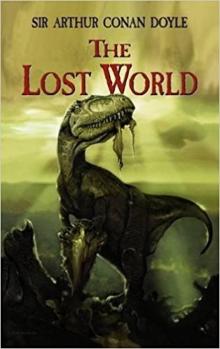 The Lost World
The Lost World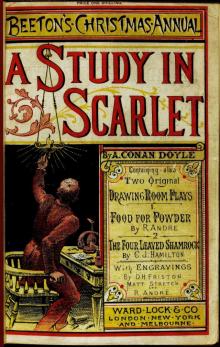 A Study in Scarlet
A Study in Scarlet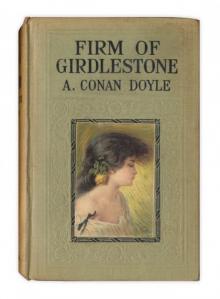 The Firm of Girdlestone
The Firm of Girdlestone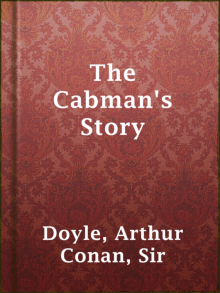 The Cabman's Story
The Cabman's Story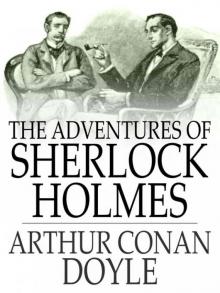 The Adventures of Sherlock Holmes
The Adventures of Sherlock Holmes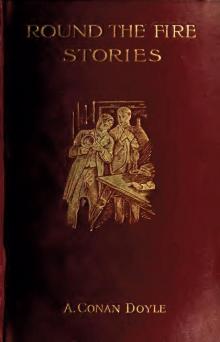 Round the Fire Stories
Round the Fire Stories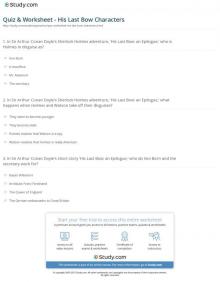 His Last Bow: An Epilogue of Sherlock Holmes
His Last Bow: An Epilogue of Sherlock Holmes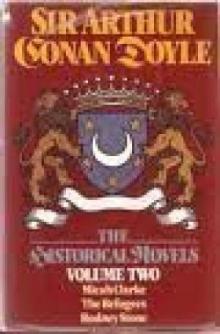 Micah Clarke
Micah Clarke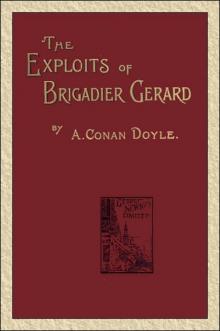 The Exploits of Brigadier Gerard
The Exploits of Brigadier Gerard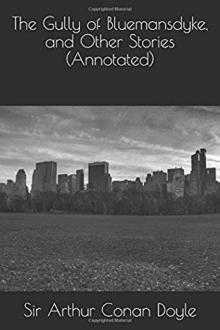 The Gully of Bluemansdyke, and Other stories
The Gully of Bluemansdyke, and Other stories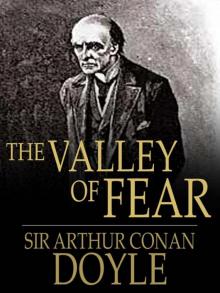 The Valley of Fear
The Valley of Fear The Last of the Legions and Other Tales of Long Ago
The Last of the Legions and Other Tales of Long Ago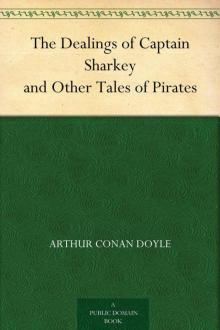 The Dealings of Captain Sharkey, and Other Tales of Pirates
The Dealings of Captain Sharkey, and Other Tales of Pirates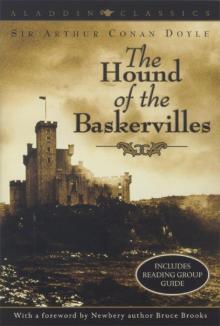 The Hound of the Baskervilles
The Hound of the Baskervilles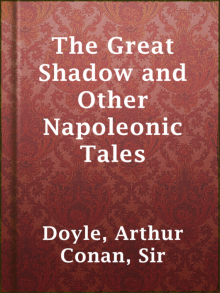 The Great Shadow and Other Napoleonic Tales
The Great Shadow and Other Napoleonic Tales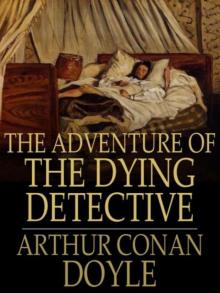 The Adventure of the Dying Detective
The Adventure of the Dying Detective The Man from Archangel, and Other Tales of Adventure
The Man from Archangel, and Other Tales of Adventure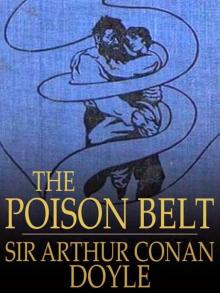 The Poison Belt
The Poison Belt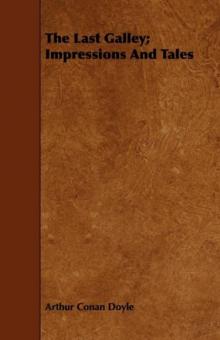 The Last Galley; Impressions and Tales
The Last Galley; Impressions and Tales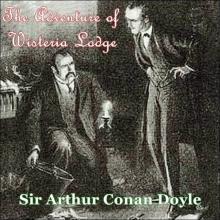 The Adventure of Wisteria Lodge
The Adventure of Wisteria Lodge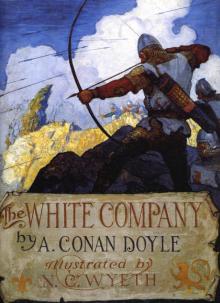 The White Company
The White Company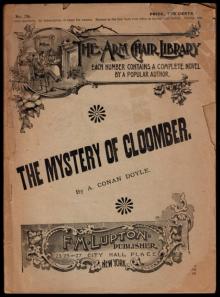 The Mystery of Cloomber
The Mystery of Cloomber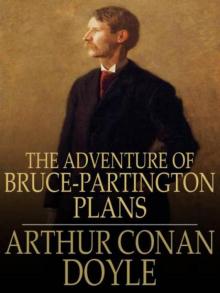 The Adventure of the Bruce-Partington Plans
The Adventure of the Bruce-Partington Plans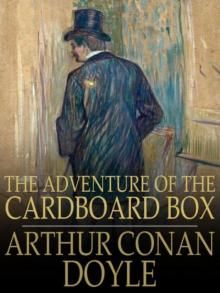 The Adventure of the Cardboard Box
The Adventure of the Cardboard Box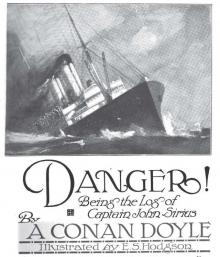 Danger! and Other Stories
Danger! and Other Stories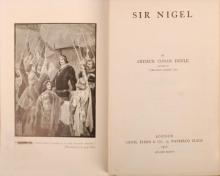 Sir Nigel
Sir Nigel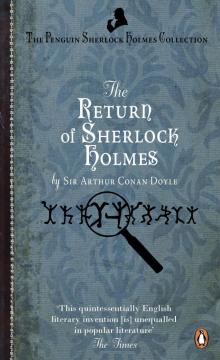 The Return of Sherlock Holmes
The Return of Sherlock Holmes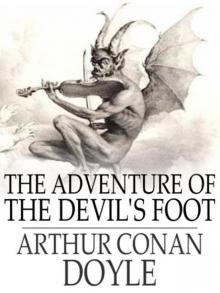 The Adventure of the Devil's Foot
The Adventure of the Devil's Foot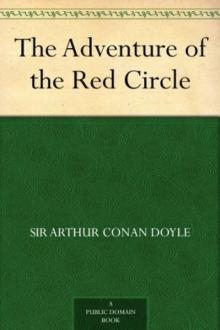 The Adventure of the Red Circle
The Adventure of the Red Circle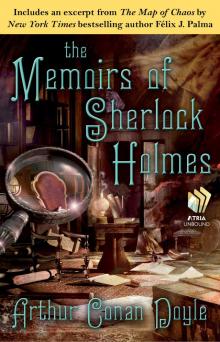 The Memoirs of Sherlock Holmes
The Memoirs of Sherlock Holmes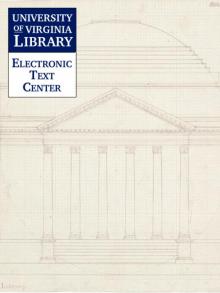 The Adventure of the Yellow Face
The Adventure of the Yellow Face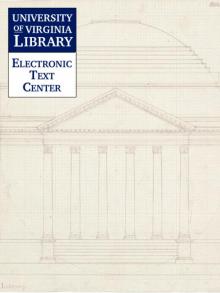 The Adventure of the Norwood Builder
The Adventure of the Norwood Builder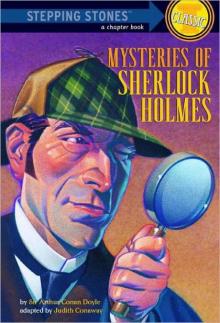 Mysteries of Sherlock Holmes
Mysteries of Sherlock Holmes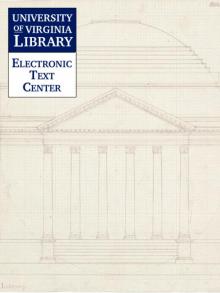 The Adventure of the Missing Three-Quarter
The Adventure of the Missing Three-Quarter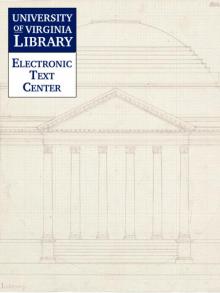 The Adventure of the Final Problem
The Adventure of the Final Problem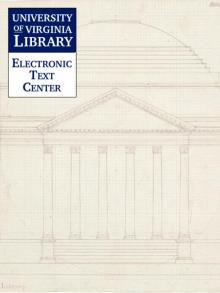 A Scandal in Bohemia
A Scandal in Bohemia His Last Bow shssc-4
His Last Bow shssc-4 Beyond The City
Beyond The City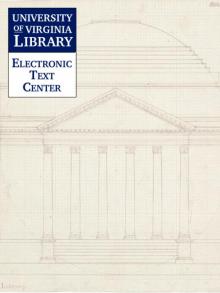 The Adventure of the Gloria Scott
The Adventure of the Gloria Scott The Parasite
The Parasite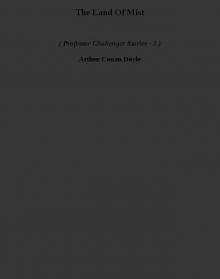 The Land Of Mist pcs-3
The Land Of Mist pcs-3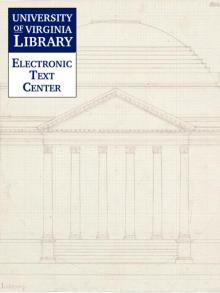 The Adventure of the Musgrave Ritual
The Adventure of the Musgrave Ritual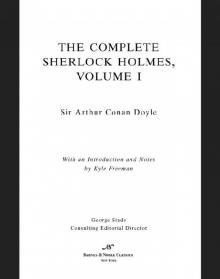 The Complete Sherlock Holmes, Volume I (Barnes & Noble Classics Series)
The Complete Sherlock Holmes, Volume I (Barnes & Noble Classics Series)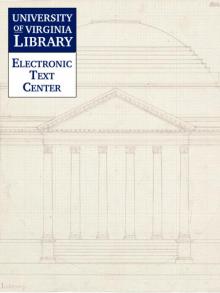 The Adventure of the Stockbroker's Clerk
The Adventure of the Stockbroker's Clerk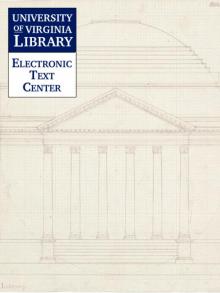 The Adventure of the Copper Beeches
The Adventure of the Copper Beeches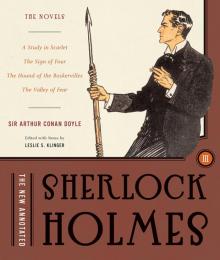 The New Annotated Sherlock Holmes
The New Annotated Sherlock Holmes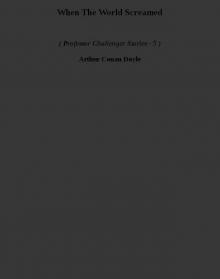 When The World Screamed pcs-5
When The World Screamed pcs-5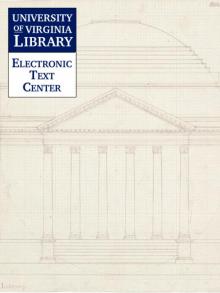 The Adventure of the Six Napoleons
The Adventure of the Six Napoleons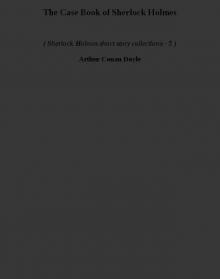 The Case Book of Sherlock Holmes shssc-5
The Case Book of Sherlock Holmes shssc-5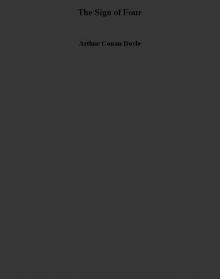 The Sign of Four
The Sign of Four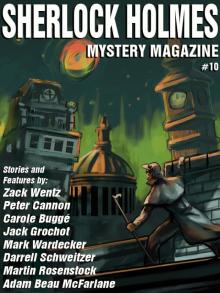 Sherlock Holmes Mystery Magazine #10
Sherlock Holmes Mystery Magazine #10 The Adventures of Brigadier Gerard
The Adventures of Brigadier Gerard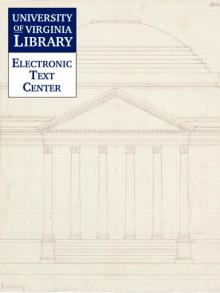 The Adventure of the Second Stain
The Adventure of the Second Stain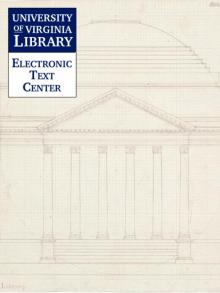 The Adventure of the Engineer's Thumb
The Adventure of the Engineer's Thumb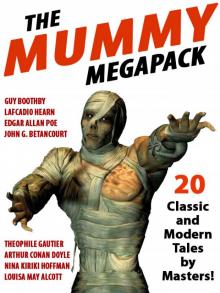 The Mummy Megapack
The Mummy Megapack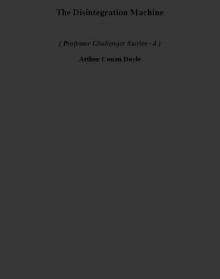 The Disintegration Machine pcs-4
The Disintegration Machine pcs-4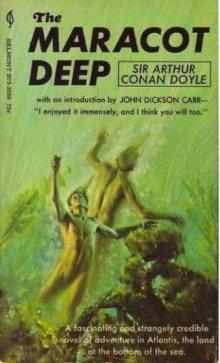 The Maracot Deep
The Maracot Deep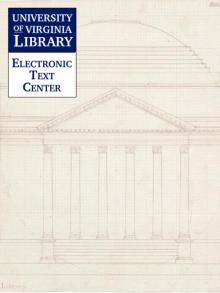 The Five Orange Pips
The Five Orange Pips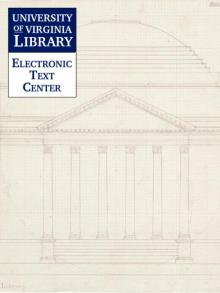 The Adventure of the Crooked Man
The Adventure of the Crooked Man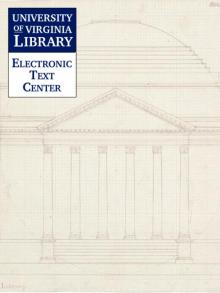 The Adventure of the Blue Carbuncle
The Adventure of the Blue Carbuncle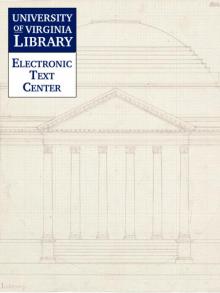 The Adventure of Silver Blaze
The Adventure of Silver Blaze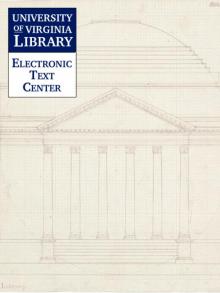 The Adventure of the Solitary Cyclist
The Adventure of the Solitary Cyclist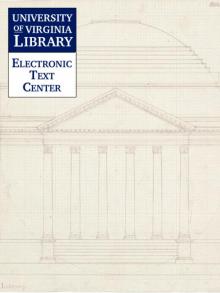 The Adventure of the Naval Treaty
The Adventure of the Naval Treaty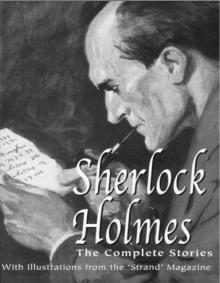 Sherlock Holmes. The Complete Stories
Sherlock Holmes. The Complete Stories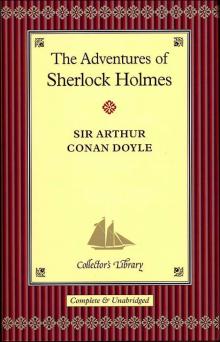 The Adventures of Sherlock Holmes (sherlock holmes)
The Adventures of Sherlock Holmes (sherlock holmes)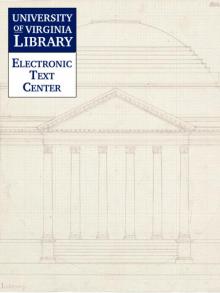 The Adventure of the Empty House
The Adventure of the Empty House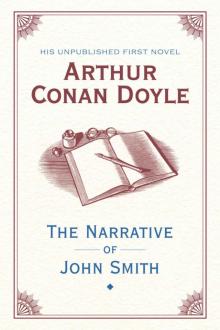 The Narrative of John Smith
The Narrative of John Smith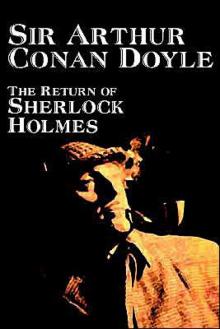 The Return of Sherlock Holmes (sherlock holmes)
The Return of Sherlock Holmes (sherlock holmes)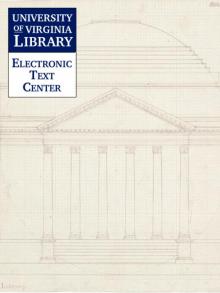 The New Revelation
The New Revelation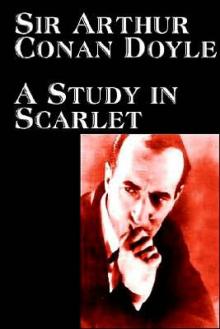 A Study in Scarlet (sherlock holmes)
A Study in Scarlet (sherlock holmes)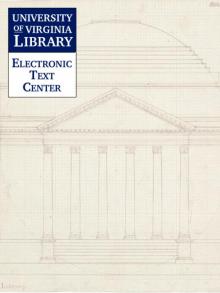 The Vital Message
The Vital Message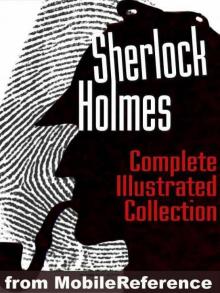 Sherlock Holmes Complete Collection
Sherlock Holmes Complete Collection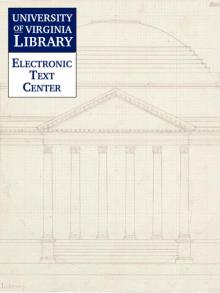 Round the Red Lamp
Round the Red Lamp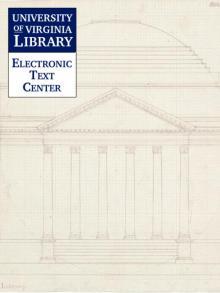 The Boscombe Valley Mystery
The Boscombe Valley Mystery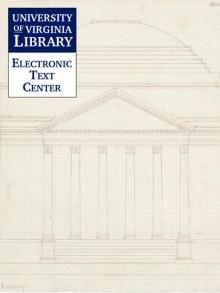 The Adventure of the Beryl Coronet
The Adventure of the Beryl Coronet The Refugees
The Refugees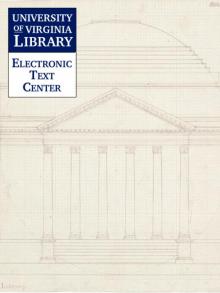 The Adventure of the Three Students.
The Adventure of the Three Students.